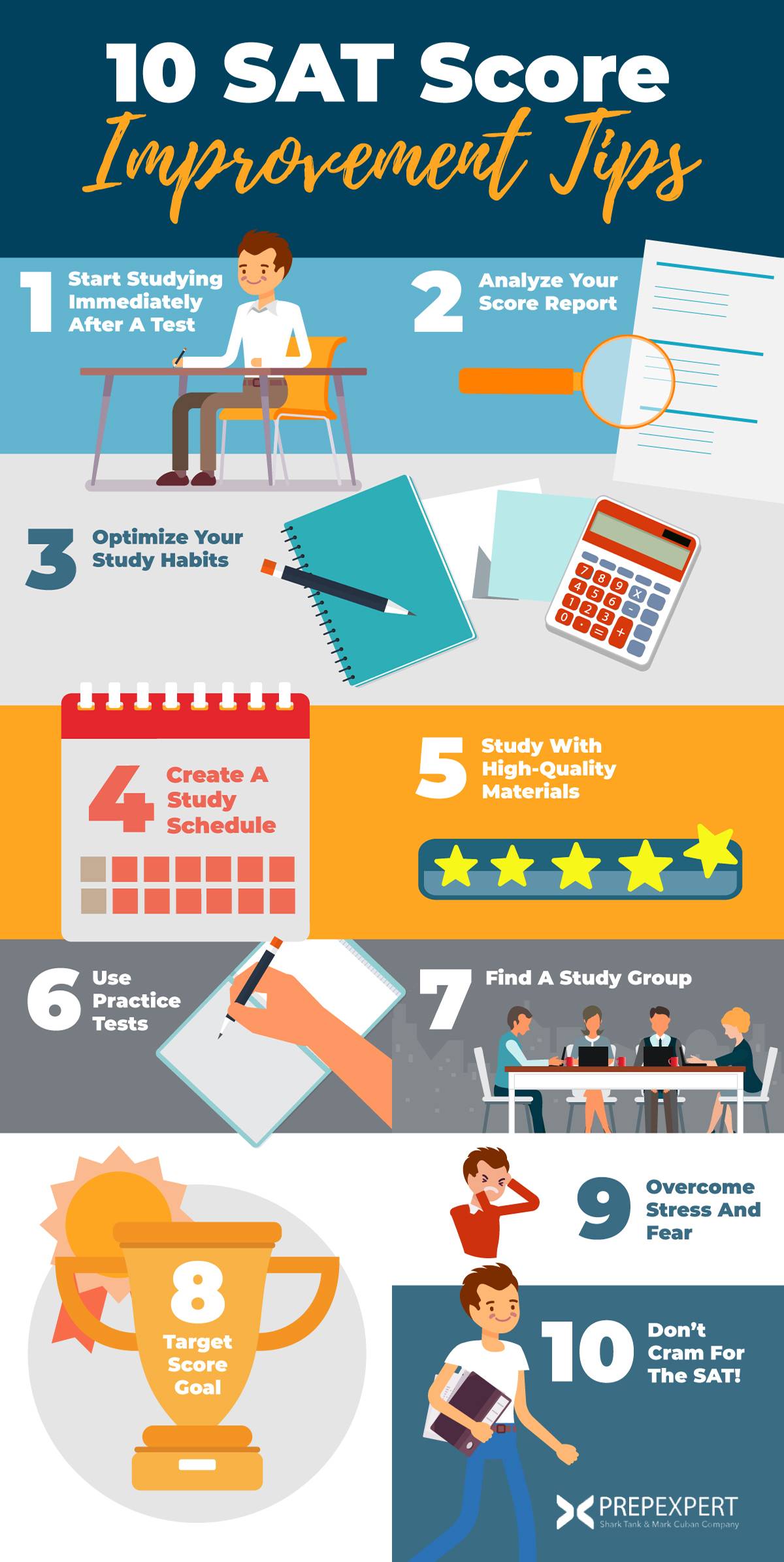It’s rare for students to score a perfect 1600 on the SAT on their first try. However, you can always improve your overall SAT score from one test date to the next as long as you have a plan and put in the hard work to follow it. Here are 10 SAT score improvement tips you can use when studying for the test and on test day itself.
1. Start studying immediately after a test
As soon as you can after taking the test, write down as much as you can remember from it. Write down anything that confused you, was unexpectedly difficult, sections you felt confident on, etc. This will help you plan for your next study cycle because now you’re aware of what you need the most help with on a live test. While your score report will help, these impression notes will help immediately start the next round of test prep.
Related: Debunk the Top 5 Myths About the SAT
2. Adjust your studying based on your score report
After taking the SAT, you will receive your official score report. Whether it’s good or bad, use that report to your advantage. Besides your total score and section scores, pay particular attention to the subscores. These are where you will receive the greatest benefit for your next prep round. Look at the weakest scores and you’ll know what needs to be focused on next. Moreover, you’ll have confidence in knowing which sections you’re already good at.
3. Optimize your study habits
Once you carve out the necessary time to study, the next important step is to optimize your study routine. Make sure to take at least one or two practice tests. The immediate benefit is identifying which sections give you the most trouble. You can then tailor your prep to what needs the most improvement.
Once you feel confident, take another practice test, grade it, and see if you’ve improved. If you have improved, that’s great; if you are still having trouble, then circle any questions you were unsure of—and especially those you got wrong—to drill down what skills you need to develop further.
Related: Check out Our Best Advice for Homework, Studying, and Tests
4. Create a study schedule
When you study, it’s important to break things up into easily digestible chunks for your brain to understand and memorize. The best thing to do is look at your current schedule, list out all your commitments, and look for gaps in availability. If you need to make space, then look at your commitments, rank them in order of importance, and consider cutting ones that aren’t essential to your overall success.
5. Study with high-quality materials
Contrary to popular belief, doing well on the SAT doesn’t just boil down to knowing a lot of math, reading, and writing skills. To score highly, you need to understand the actual test structure itself. The SAT operates through specific patterns you can use to your advantage.
The trick is to learn how to take the SAT. To do that, you need to use the most accurate study materials available to realistically replicate the experience and avoid developing bad habits and incorrect skills. Fortunately, the College Board and other resources like Prep Expert provide quality study materials that accurately replicate the test-taking experience.
6. Use practice tests as warm-ups and progress reports
Taking the SAT is a significant commitment that requires a lot of work and study. You need to simulate test-taking conditions to be ready for the time constraints you’ll face. Realistic practice tests will train you on both the test’s format and develop your physical and mental stamina for every section. Take multiple practice tests during your prep cycle to measure how much or little your studying is affecting your potential test score.
Related: Understanding Standardized Tests and Scores
7. Find a study group
Sometimes it’s too hard to do it all by yourself, and study groups can help you improve and stay motivated. If you’ve been working on improving scores or problem areas and hit the wall, then don’t be afraid to look for help from peers. Chances are you’re not the only person in your class taking the SAT, so take advantage of that and join a study group with other classmates.
8. Set yourself a test score goal
One way to help focus your studying and motivate yourself is to define a goal for the score you want to hit. If you’ve taken the test already, then you can assess your section scores, especially the subscores, and use them to create a realistic improvement goal. If you have specific schools in mind that you’d like to attend, look at their SAT score requirements as goals to hit for motivation.
Related: How to Set Reasonable Expectations for Your SAT or ACT Scores
9. Use your study skills to help manage stress and fear
Taking the SAT can be nerve-wracking, but it doesn’t have to be. When preparing, it’s easy to feel overwhelmed by the test and pressured about failure. Don’t let that fear overtake you. Instead, when studying with practice tests, look at every wrong answer as a learning opportunity. If you miss a question, focus on why. Understand that insight and your entire study approach will be engaging rather than taxing.
10. Don’t cram for the SAT!
The SAT isn’t like your regular high school test; there’s too much information to know about the material and test format to shove into your brain at the last possible second. That’s why you need to set aside time and schedule well in advance before signing up for a test date. Setting aside one or two months of consistent prep time before a test is recommended for positive results. Your brain and nerves will thank you for it later.
Related: How to Improve Your Time Management and Study Skills







